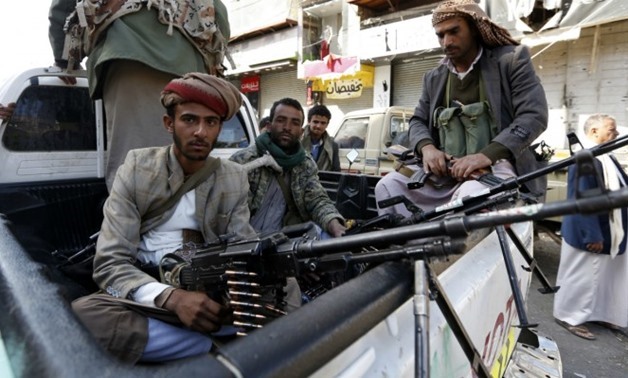
Houthi rebels in front of the residence of former president Ali Abdullah Saleh in Sanaa - AFP
CAIRO – 30 April 2018: A military solution is the most appropriate way to handle the instability caused by Houthi militants in Yemen, according to Yemeni National Army Spokesman Brigadier General Abdu Majali. Houthi militants will continue to target the Yemeni people until they surrender their weapons and Iranian intervention in Yemen is combated, he continued.
Speaking to Egypt Today, Abdu Majali said that the Arab coalition and Yemeni army will not allow for any group to hold a weapon and position its control over the Yemeni people.
He added that Houthis are obstructing the delivery of humanitarian assistance such as food and medical supplies to several cities in Yemen, especially to Dhamar, causing the suffering of the Yemeni people.
Abdu Majali mentioned that the Houthis are obstructing U.N. organizations’ actions in Yemen. Recently, 11 vehicles carrying food and medical aids were stopped and seized to be sent to their elements, which proves their bad intentions toward Yemen.
This comes amid increasing Arab coalition strikes and an expanded military operation against Yemeni rebels, in order to achieve stability in the country. Futhermore, clashes have escalated following the death of Houthi commander Saleh al-Sammad, head of the Supreme Political Council, who was killed last week in an air raid claimed by Saudi Arabia and its allies.
In this regard, Abdu Majali added that Iran still supplies Houthis with weapons, in addition to many Iranian military investors who support the Houthi rebels in their military operations. However, Arab coalition forces have become more powerful and have detailed information regarding their movements.
He confirmed that Iran’s pernicious objectives have urged all parties to unify to combat the Houthi terrorists, referring in this regard to the increased military operations in Saada, Taiz and Al Bayda, along with combating al-Qaeda elements in Hadramout.
Egyptian Foreign Minister Sameh Shoukry stressed Egypt’s commitment to support Yemen’s stability, and urged the necessity of a political solution to the Yemeni crisis. Shoukry’s statements came after he had received his Yemeni counterpart, Abdel Malik al Mekhlafi, in Cairo on Sunday.
Shoukry reviewed the Egyptian-Yemeni relationship, noting that Egypt’s recent medical and humanitarian aid to Yemen shows the deep ties between the two countries.
Foreign Ministry spokesman Ahmed Abu Zeid said Shoukry reiterated Egypt's support for the unity of Yemen, pointing out that there is no military solution to the Yemeni crisis and calling for a
to ease the suffering of the Yemeni people.
On April 28, a Saudi-led coalition air strike killed dozens of Yemeni rebels, including two commanders, in another blow to the insurgents following the assassination of their political chief.
The rebels have been locked in a war with the Saudi-led military alliance since 2015, fighting to restore the internationally recognized Yemeni government to power.
The Houthis, who hail from northern Yemen, control Sanaa and much of the country's north which borders Saudi Arabia, and the key Hodeida port on the Red Sea coast.
The Houthi rebels staged a public funeral on Saturday for Sammad. Shortly after Sammad's funeral began, the Houthis said they had launched eight ballistic missiles into Saudi Arabia.
The coalition confirmed it had intercepted four missiles headed for the southern Saudi coastal city of Jizan, one day after the Kingdom's defense forces said they had downed a missile headed for the same area.
Comments
Leave a Comment